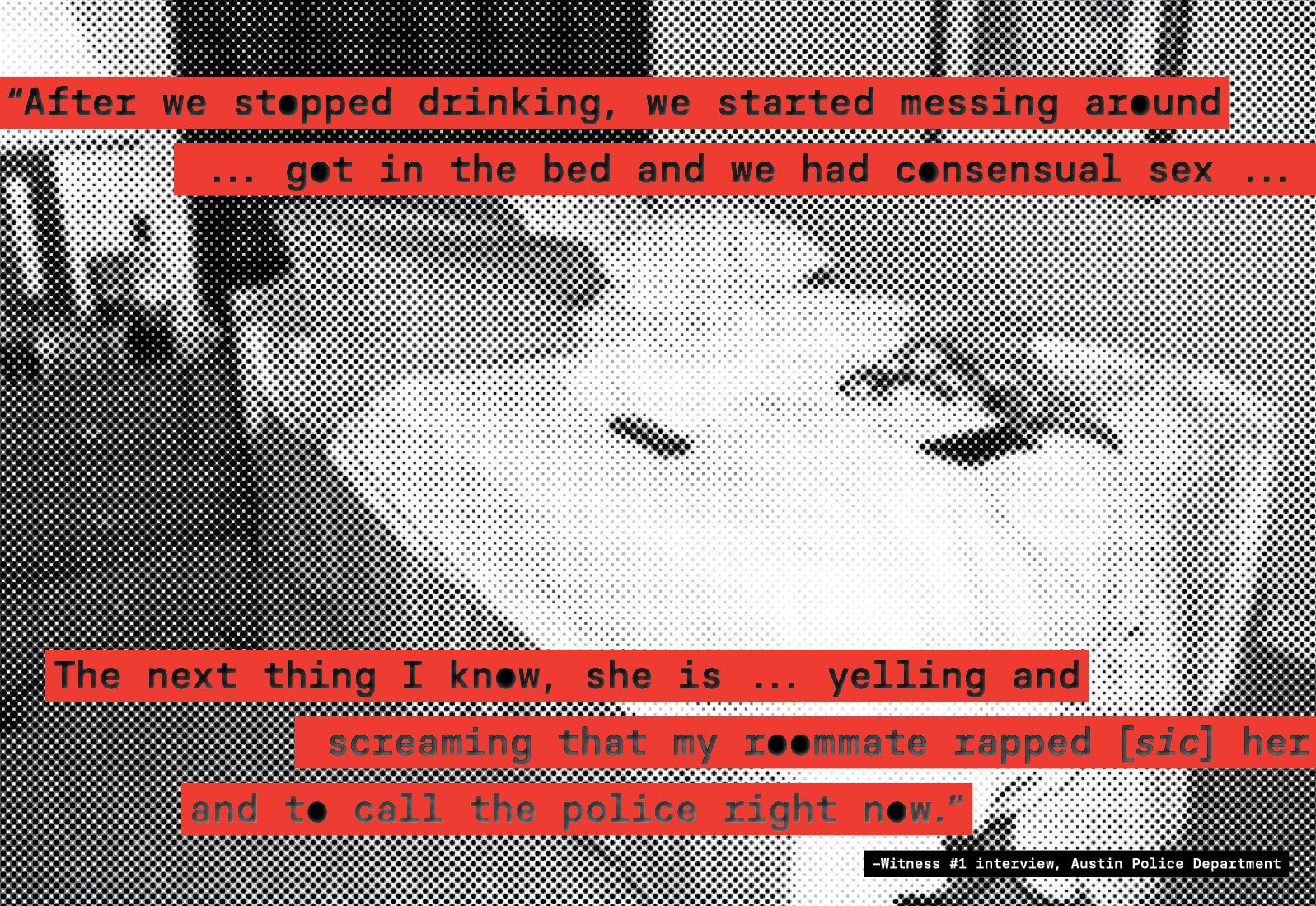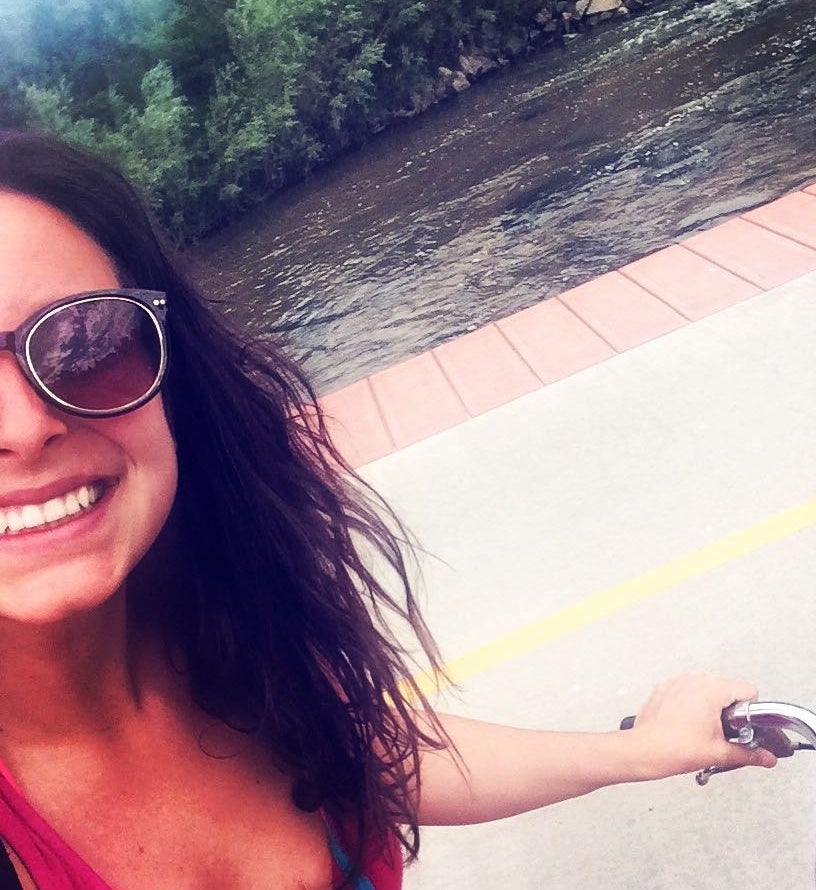On Aug. 21, 2016, Samantha lay asleep on her stomach in a hotel room bed in Austin when, she said, she awoke to the pain of being raped.
She opened her eyes and saw the man she had hooked up with the night before passed out next to her. When she pushed herself up and turned around, she said, she saw another man standing behind her, completely naked, holding his penis. He allegedly ducked down and ran into the bathroom. Samantha screamed.
Minutes later, she did what few victims do immediately after being sexually assaulted: She reported it to police.
“I went home with this guy, and his roommate literally just fucking had sex with me while I was asleep in the bed next to him,” Samantha, then 25, said, crying hysterically, according to a recording of the 911 call. “It just happened. I just woke up to it happening.”
In the hours and months that followed, Samantha did everything she could to hold the man accountable. After leaving the hotel, she went straight to a sexual assault clinic where nurses swabbed and scraped her body for evidence. Two weeks later, she provided another statement to police. Then, this past November, she testified at his criminal trial.
Prosecutors believed her, and they believed in the case. After all, they’d caught the defendant in a lie: He initially denied having sex with her, but DNA testing showed that he had. At trial, he described a completely different sexual encounter than what Samantha had reported and said it was consensual.
After hearing all the evidence and testimony, a jury acquitted him.
Three jurors spoke to BuzzFeed News about the closed-door deliberations where the case fell apart. They didn’t think Samantha was lying, but jurors still had doubts that led them to a verdict of not guilty. Their accounts show that even as men like Harvey Weinstein are starting to be held accountable in the #MeToo era, in a rare rape case that makes it to trial, believing women isn’t necessarily enough for the criminal system.
“Was justice served?” one juror asked. “Probably not.”

The night before she reported being raped, Samantha, who asked to be identified by her first name only to protect her privacy, had gone out for drinks with a friend. As last call neared, they were drinking tequila shots at the bar when three men approached them. Two started talking with her friend, while the third sparked up a conversation with Samantha. They immediately hit it off.
She learned he was in town to celebrate his birthday with some buddies. After taking some more shots, she agreed to go back to his hotel and spend the night with him.
From there, things got hazy. Samantha said she didn’t remember leaving the bar and only kind of remembered being in the car to the hotel. A photo she posted on her Snapchat showed her and the birthday boy cuddling up together in the elevator with one of his friends, the man she later identified as her rapist, in the background.
She wasn’t 100% sure if she and the guy she was in bed with had sex, but she is adamant that she remembers quite clearly what happened when she woke up around 8:40 a.m.
“I felt like I was having sex and I was still, like, waking up,” Samantha told a detective later that day, according to an audio recording of the interview. “I was just, like, kind of confused because I was, like, wait, what? Who’s having sex with me? This isn’t right.”
She said she had turned around in time to see his friend jump off her and run into the bathroom, according to the recording.
“Was justice served? Probably not.”
Both the man Samantha had hooked up with and another friend who was in the room told police they woke up to Samantha screaming that she had been raped, but they didn’t see the alleged assault occur.
The defendant, whom BuzzFeed News is not naming because he was acquitted, declined to comment for this story through an attorney.
He told police that morning he had just gotten out of the shower when he heard “a lot of commotion,” saying that at first Samantha seemed “confused” about “who was on top of her” before pointing the finger at him, according to an audio recording of his interview with a detective.
While the other two men in the room also said Samantha seemed unsure of who had just raped her before the defendant appeared, she told BuzzFeed News she always “knew that whoever raped me ran into the bathroom.”
She told police the defendant had yelled at her, called her crazy, and tried to kick her out of the room. After she said multiple times that she needed to call the police, he responded, “call them,” and then dialed 911 on his phone and threw it at her, according to Samantha.
Police asked the defendant if he ever put his penis inside her and if there was any reason they would find his DNA in her vagina. He said no, multiple times.
“I don’t see how you would find [my] DNA in [her] vagina unless that girl got on top of me and ride me when I was sleeping — I would know that,” he retorted. “My DNA definitely shouldn't be inside that girl.”
But, at trial, after DNA testing showed the defendant’s semen inside her, he said he did have consensual sex with Samantha, just not at the time or in the way that she described. He testified that he lied because he, a black man, was afraid to tell police the truth, prosecutors and jurors recalled.
Travis County Assistant District Attorney Andrew Rountree told BuzzFeed News he tried to show the faults in the defendant’s story, pointing out that no one had seen his version of the encounter or even that he and Samantha had interacted in a romantic way. Rountree also questioned him on the details of the consensual sex he described, like what position they were in and whether they said anything to each other, but he didn’t have answers.

“He could not recall any of those details,” he said.
In addition to the DNA evidence, prosecutors presented the jury with the 911 call, the sexual assault exam report, statements provided to police, and testimony from Samantha, the two other men in the room, and others.
The defendant’s attorney declined to comment for the story, but a partial transcript of the trial showed the defense raised questions about Samantha’s credibility by focusing on her confusion around what happened after she left the bar and her history of trauma.
“It was very plain that she is an emotionally disturbed woman,” said William Lee Carter, an expert psychologist who testified for the defense after reviewing the evidence and watching Samantha’s testimony.
Another witness also mentioned that Samantha had reported previously having PTSD, however, prosecutors said that information wasn’t supposed to be presented during the trial and jurors weren’t told what event triggered the disorder.
Still, the testimony about her mental health and the lack of clarity about the incident raised questions for jurors who came to doubt the accuracy of Samantha’s story.
“It’s not that we didn't believe her,” one juror said. “In fact, I would say the most ardent of the not guilty [ jurors] very much did believe [and] understood her story, but they still had doubt.”

The jurors, who asked for anonymity because they did not want their names to be associated with the case, said they didn’t doubt that Samantha went through something traumatic that morning. But because of her history of PTSD and because she had been drinking and couldn’t remember much of what happened before she fell asleep, they questioned if she was unknowingly projecting a previous trauma onto the situation.
“All of these things very much did paint a gray cloud,” he said.
When it comes to evidence, juries tend to have “unreasonably high expectations” for what information should be available to corroborate a victim’s story, said Camille Cooper, vice president of public policy at the Rape, Abuse & Incest National Network.
“They call this the CSI effect. They want every single case to have a silver bullet,” Cooper told BuzzFeed News. “Juries want to be 100% certain, and they want to see a lot of the things that they've seen on television, and you know, a lot of the times that just simply doesn’t exist.”
“It sounds like she did everything right, and it sounds like this particular jury failed her.”
Cooper said the testimony from the two men who told police they woke up to her screaming that she was raped was corroboration of Samantha’s account and that the jury should have given more weight to the fact that the defendant changed his story.
“It sounds like she did everything right, and it sounds like this particular jury failed her,” Cooper said.
But a lack of certainty from the defendant’s friends on what exactly happened that night also confused jurors. Although one told police he and Samantha did have sex, he testified in court that he couldn’t remember if they had. The other man testified that he had heard what he believed to be sex between Samantha and his friend while the defendant was lying asleep next to him in the other bed, but he didn’t know what time in the night that happened, prosecutors said.
Even though neither of the two ever said they had seen Samantha and the defendant together, jurors didn’t think that was enough to conclude that his story of consensual sex was a lie. Without a clear timeline or understanding of what had happened in the early morning hours, jurors felt like they could not say with certainty that Samantha did not consent to having sex with the defendant.
“If no one can remember what had happened, then the issue of consent becomes that much more foggy,” a juror said. “If she can’t remember anything from that night, then she doesn't know what she did or did not say, who she was OK with, [and] who she wasn’t.”
There were other details that didn’t add up in their minds. For instance, they didn’t think it made sense for the defendant to give the victim his phone to report the incident if he had done what she said he did. And how could the other men in the room, one who testified that he woke up with his arm draped around Samantha’s body and the other friend, who testified that he was a light sleeper, not be awoken by the alleged assault, jurors wondered.
Another issue some jurors had was that a summary of the incident written by the nurse who conducted the sexual assault exam stated that Samantha had said “it feels good” regarding her recognition of the feeling of having sex when she woke up — a discrepancy in her story that was difficult grapple with. Samantha told BuzzFeed News she doesn’t think she said this and that the note was a mistake.
“Was she dreaming of something that had happened already, or was it really happening when she said?” another juror said.
At the end of the day, the jury felt they had reasonable doubt and that there wasn’t enough evidence to prove the rape occurred even though, as one juror said, more people believed Samantha’s story over what the defendant said.
“No one was 100% sure what happened in that room, and we wish there was a camera. We wish there was something, but we couldn’t — no one could be 100% sure and no one was happy with the outcome,” a juror said.

For Samantha, the verdict was devastating.
After returning home from the trial, Samantha, who now lives outside the US, dealt with nightmares and attempted suicide several times.
“I have to try to go to sleep every night and just tell myself if he does this again, it’s not my fault. It’s not on my hands — that’s what everyone keeps telling me,” she told BuzzFeed News. “It’s on the jury’s hands, but it doesn’t feel that way in my heart.”
She said she is still struggling with how the jury could say that they believed her — and not find the defendant guilty.
“I feel like this jury wouldn't have been happy unless they were standing in the room and witnessed it for themselves,” she said. “When are we going to finally say enough is enough and hold people accountable?”

The idea that they could potentially put an innocent person in jail weighed heavily on jurors in this case. It’s part of the reason why none of them wanted their names published in this story.
“It's either an innocent man goes to jail or a victim doesn't get justice,” a juror told BuzzFeed News. “Both ruin someone's lives.”
Had this been a civil case, where the bar for guilt is much lower, the juror said the outcome may have been different.
“I think that bar was easily cleared,” he said.
But the odds in criminal sexual assault cases are inherently stacked against the victims. Most rapes are not reported and those that are rarely go to trial — less than 2% according to one recent study of six jurisdictions.
“This case simply underscores how difficult these cases can be even with very compelling evidence."
At trial, the burden is on the prosecutors to prove that a crime occurred beyond a reasonable doubt and, in some cases, the only evidence available is a victim’s word, which is often contradicted by the defendant.
Even in cases like Samantha’s, where there is DNA evidence, it is still difficult for juries to make a decision because that evidence only corroborates that sex occurred — not whether it was consensual or not.
“This case simply underscores how difficult these cases can be even with very compelling evidence,” said Rountree, the prosecutor. “And that’s a challenge that we willingly embrace and we accept, but it's a challenge nonetheless.”
Jim Hopper, an independent consultant and teaching associate at Harvard Medical School who specializes in psychological trauma, said juries in many cases don’t have enough information to know what’s a reasonable doubt and what’s not. More also needs to be done to educate the public about the impacts of trauma and sexual assault on memory and the brain, he said.
“For all experiences, we don't remember everything that happened. We remember what stood out to us and, as time goes on, we tend to remember the gist of what happened,” he said. “We should expect and not be surprised if people have missing pieces and if they even have inaccuracies about some things that were not central details for them — that’s true of all memories.”
And Hopper said that in spite of what jurors feared, past trauma does not typically make victims’ memories less reliable than anyone else’s.
“The things that got attention and significance, they tend to be accurate over time. They tend not to fade and be lost,” he said.
When she testified, Samantha said she was never asked any questions about her PTSD, which she said was triggered by a street attack in Uganda when she was a Peace Corps volunteer in 2014, or given an opportunity to explain how it impacts her life.

“Just because I have PTSD does not mean that I was not assaulted. It does not mean that I do not understand what is going on around me,” she said. “I have nightmares, but I know the difference between a nightmare and waking up from a nightmare and waking up to being assaulted.”
While none of the three jurors who spoke to BuzzFeed News said they regretted their decision, two of them expressed doubt that justice had been served in this case.
“My gut says the guy is guilty, but the evidence and everything does not,” one juror said.
Another juror said she felt this experience showed her the difference between finding someone not guilty beyond a reasonable doubt and believing they are innocent.
“Without it being clearer than it was, how do you convict somebody? But were they really innocent? That’s something we can’t say,” she said.
In spite of the trial’s outcome, Samantha still feels she made the right decision to come forward. When the trial ended, she was heartbroken and wished she had never gone back to Austin to testify.
But now, she is finding peace in knowing that she did everything she could — even if it wasn’t enough to sway a jury.
“I don't think they made the right decision, but I think I did,” she said. “I at least tried. I tried to do my part to make the world a little bit safer.” ●
